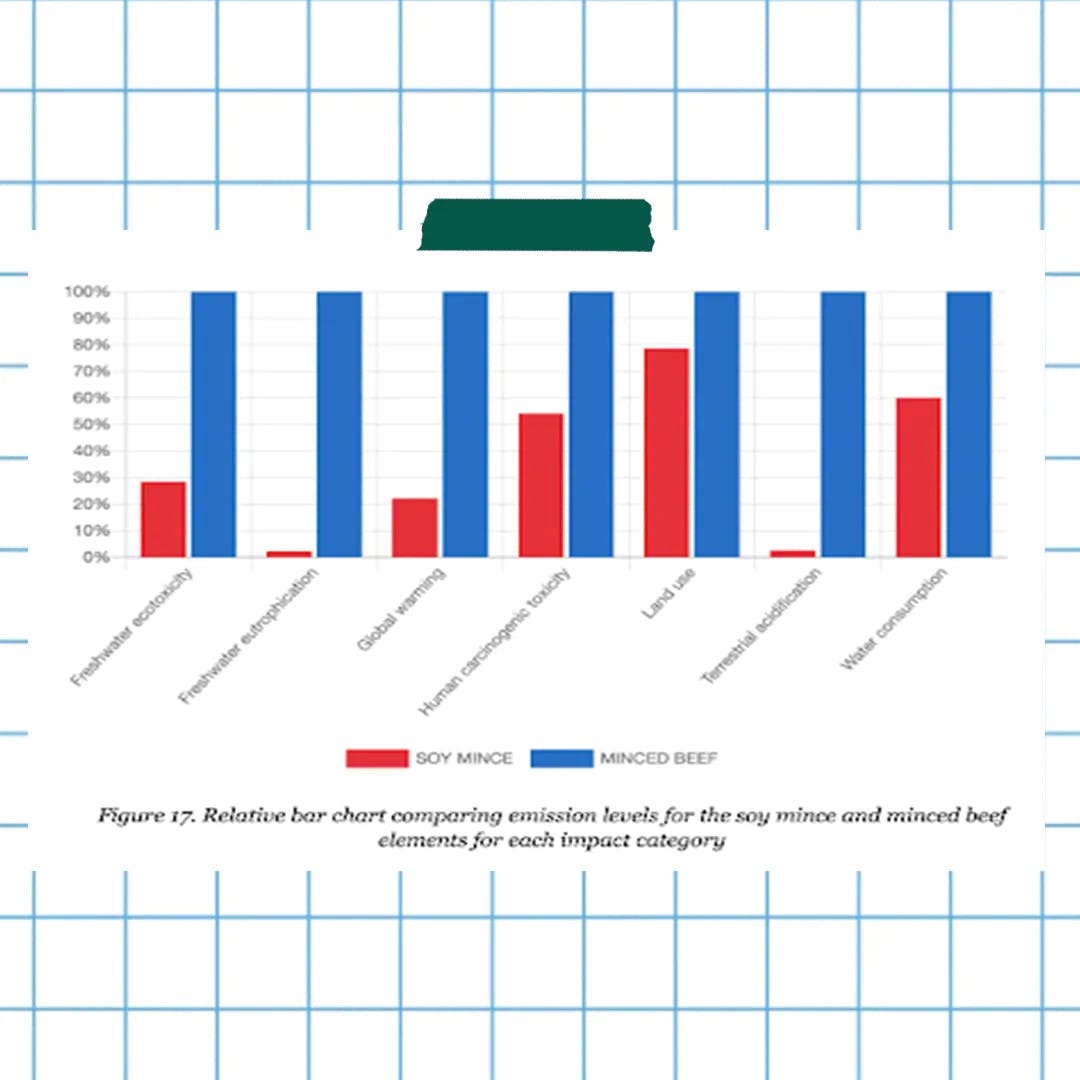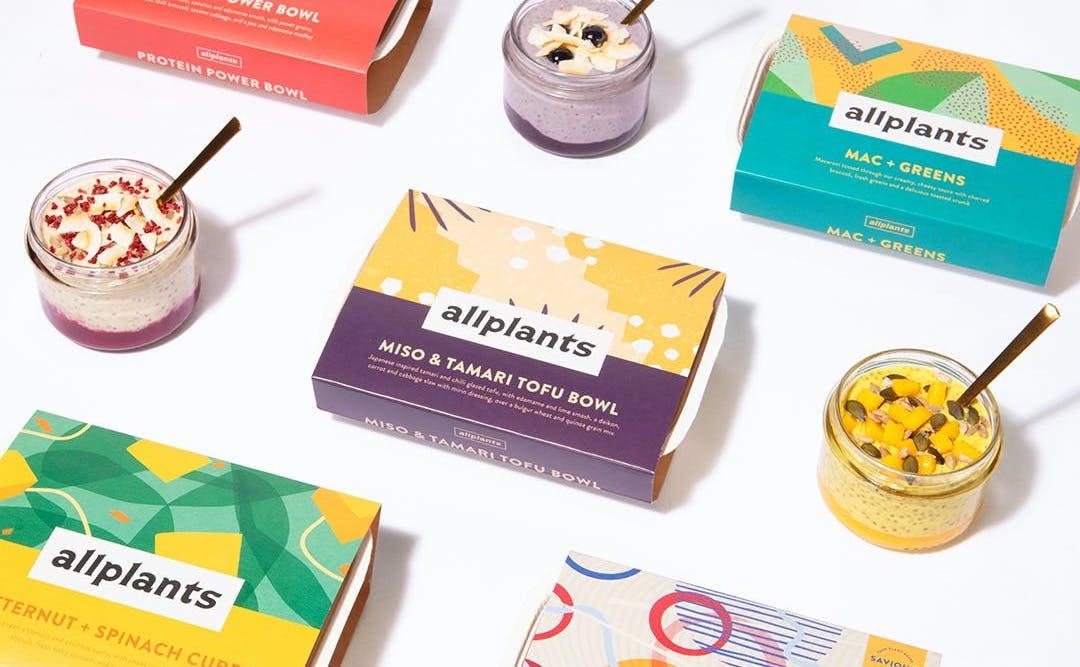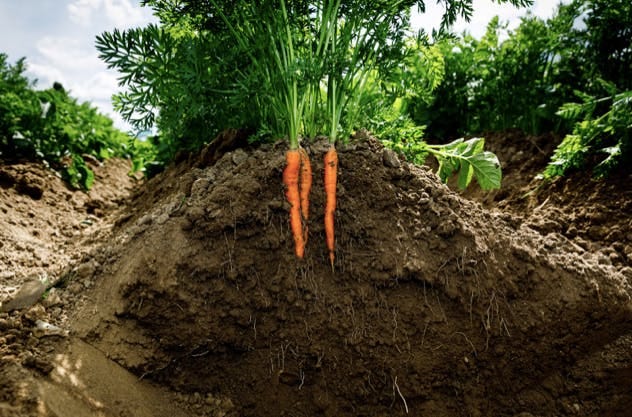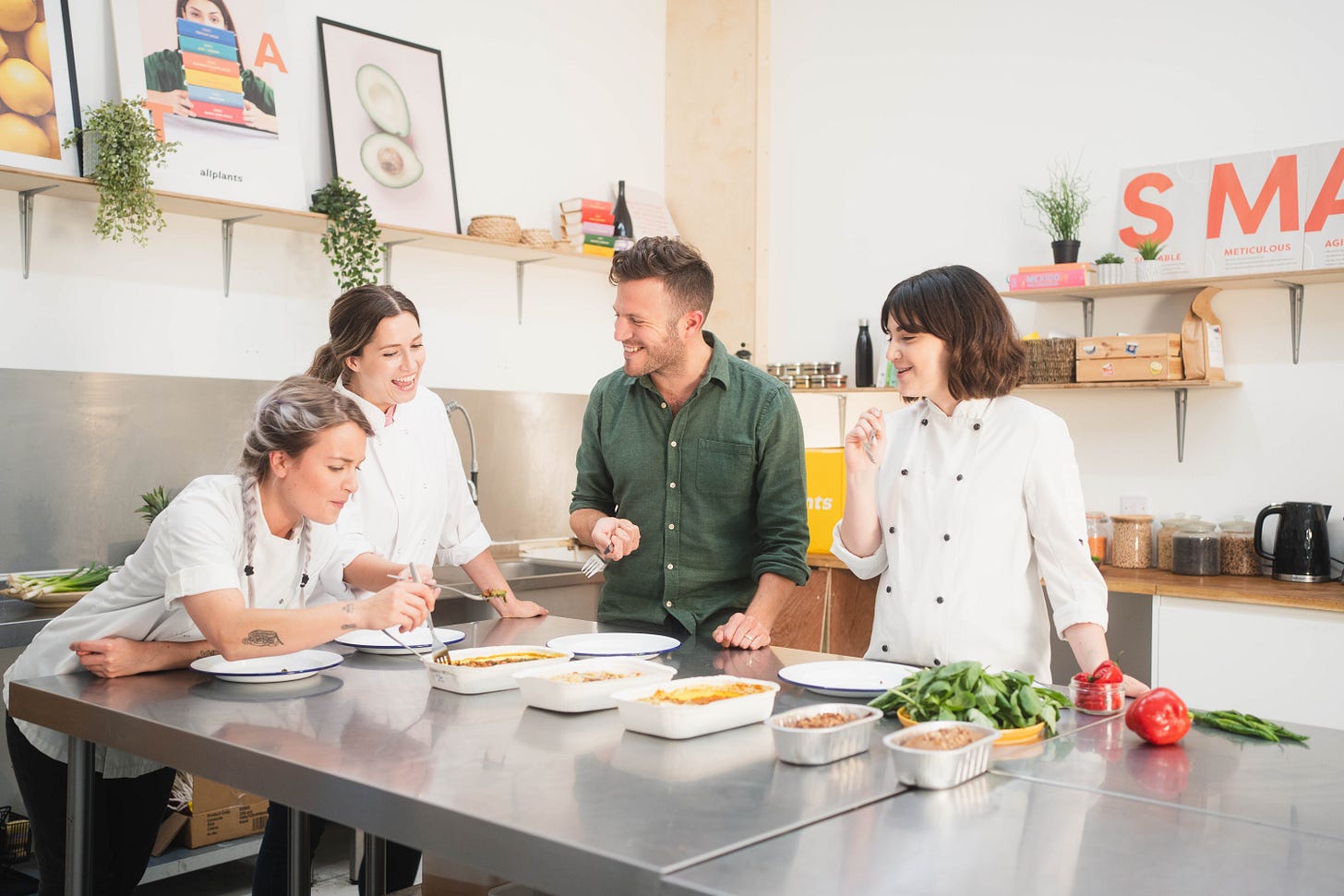💥 #9 - Meet the Brands: allplants are going all-in on a more sustainable food system.
Featuring Ellie Harrison, Sustainability Lead at allplants
allplants - 100% plant-based meals, packed with nutrition but light on environmental impact. The leading plant-based living platform in Europe, and one of the few venture capital backed B-Corps in the world, allplants have recently raised a record-breaking Series B funding round of £38 million. Over the past five years, allplants have saved over 3,600 tonnes of CO2 (equivalent to 1,272,962 kg of coal or 44,398,420 plastic bottles) from being produced - by simply not using livestock in their meals.
The allplants aim? To make plant-based food a ‘supremely positive choice that is delicious, healthy, accessible and full of joy’.
The allplants mission? To leverage their high growth for sustainable change and solve the climate crisis at scale, whilst constantly finding ways to reduce their impact as they go.
We caught up with Ellie Harrison, Sustainability Lead at allplants. Part of the allplants team for over 5 years, Ellie has helped build and define their strategy for changing the food system, one delicious dish at a time. From regenerative agriculture to designing their recipes for a lower impact, Ellie’s insights will leave any brand inspired.
Haven’t subscribed to Following the Footprints yet?
“When we redefined our strategy in 2020, we realised that there was huge untapped potential upstream to reduce our waste at the source. Essentially, how can we stop this waste from being generated in the first place?”
👉 How would you summarise the work you’re doing, and have done, to become more sustainable as a brand?
allplants was born around a sustainability mission, and so our main priority was, and always will be, creating delicious food that helps people shift to a more plant-based lifestyle. As we started to stretch our legs a bit and become more established, we decided to certify as a B Corp as soon as possible. We achieved certification in 2018, a year after we started trading. B Corp certification has always been at the forefront of our sustainability mission, and so from 2018 to 2020 it heavily informed our strategy in sustainability. The assessment is super broad so our efforts have been really broad too - covering community, charity, supply chain auditing to tracking energy and water use across the company.
Then, in 2020, we took a big step back and completely redefined our strategy - you could also see it as properly defining it for the first time! That was a big process. I moved into sustainability full time within allplants, and also completed a six month systems thinking course. Off the back of this course, we decided we needed to attempt to map the entire food system we operate within, identify key issues and trace them back to the root. We also layered on to this 'map' a view of where we as a company fit within that system and, crucially, where we have leverage to bring about high impact change. This helped us narrow down our strategy into five key areas, split into human-kind and planet-kind.
For human-kind, we’re focusing on:
People behind the food - we want to put a face to our food and celebrate the work that our growers and processors do, which otherwise tends to go unnoticed and is therefore also undervalued. There’s a big weighting issue in most supply chains in terms of where the value is distributed. Bringing growers and processors to the forefront and celebrating the provenance of our food is a really important step in redistributing that value up the supply chain.
Sustainable nutrition - put simply, this means getting healthy plant based food to as many people as possible. We want to reach as many people as possible, from all backgrounds, with our plant-based mission, so we post hundreds of free recipes on our 'Planted' blog and also donate tons of plant-based meals to food charities around London.
For planet-kind, we’re focusing on:
Food waste - as a food company, reducing food waste has always been a big part of our sustainability efforts. When you see waste being created, you’re compelled to stop it. This is an area we’ve made huge progress in.
Beyond net zero - we’ve publicly committed to Net Zero 2030 as part of both the B Corp Climate Collective and the Tech Zero Task Force. We never air freight ingredients to the UK, they’re all transported via ship, and we also power our kitchen with 100% renewable energy - to name two things!
Future Forward Farming - This is a big, big focus for us. We know that our ingredients are our biggest area of impact, as with all food companies (even vegan ones).
👉 When you decided to redefine, or better define, your strategy in 2020 - where did you start? What steps after the systems thinking course did you take?
It's a pretty daunting task, and we spent a while deciding how to approach it. I quite literally started with mapping the food system from my perspective, and with input from the team. It will never be a complete view, as it’s from our point of view, but we wanted to trace the key issues back to their roots. Then, we identified which of those issues mapped against allplants' 'leverage points' in the food system. What we were looking for were the areas as close as possible to the root cause of the key problems, where we felt like there was an overlap with allplants and where we felt we could bring about change. Essentially, we wanted to know how to be the best and most efficient lever for change.
👉 What steps have you taken to evaluate the environmental impact of your business? You’ve mentioned in the past completing a Life Cycle Assessment (LCA) on a few of your products?
A year and a half ago, we had an LCA done by a Bath University Masters student who worked with us on evaluating our Smokey Soul Chilli dish. We felt that this dish was the most representative of our entire range, in terms of ingredients and processes, so the results could tell us as much as possible about our range - but from one assessment. That was fascinating, and really reassuring. We did a direct comparison with a Beef Chilli.
What were your biggest findings?
The most compelling finding was an 80% reduction in global warming potential from the standard Beef Chilli to our Smokey Soul Chilli. That’s literally just replacing beef with soy protein, and not changing any other ingredients or any other part of the process. Everything else was controlled, it was just one switch. It blew our minds. It’s an incredibly high reduction for one simple difference. For context, if every meal was comparable to our chilli we would cut the contribution of protein production to global warming from 0.5 to 0.1C.

INSIGHT: All greenhouse gases have a ‘global warming potential’, which (put simply) means their ability to trap head in the atmosphere, which leads to global warming. The global warming potential of each greenhouse gas can be compared, and is often compared to CO2. In this context, an 80% reduction in global warming potential means that the Smokey Soul Chilli has 80% less impact on global warming. Read more here.
Have you measured the impact of the rest of your range?
Up next for us is completing a carbon assessment on the entire business. We want to have our first company footprint, so we have a clear idea of any hotspots, and we’re partnering with ClimatePartner to do this!
From our research, and the LCA study, we know that our ingredients will be the biggest portion of our footprint. Beyond transport, packaging, manufacturing, energy, it will be ingredients. Knowing this over the years has led us to create the Future Forward Farming pillar. We want to channel a lot of energy and focus in this area, ahead of knowing our full footprint.
What will your boundaries be, as you work with ClimatePartner to measure your impact? Will you complete further LCAs, map your entire activity chain, or just focus on Scope 1 or 2?
We're collecting data from as far up the supply chain as we can possibly go, and we're going as far as to include end use (storage + cooking with the customer) and end-of-life packaging impacts (recycling, disposal etc). We are going ahead with these individual product footprints, with plans to label every dish with their environmental impact in 2022. Then, we’ll also select a range of our products - one main, one dessert, one side - to complete an LCA on and get a more detailed picture. Long term, we’d love to have an LCA for every product and every product to be labelled with its impact.
👉 Apart from ClimatePartner, and Bath University, are there any other partners that you’re working with or have been helped by?
The B Corp Climate Collective have been a huge source of support. Additionally, the Tech Zero Task Force, which we are a founding partner of, has been massively helpful for us. Everyones at a similar stage, they’ve made commitments, and they loosely know what they need to go after, so we’re all figuring it out together which is great. Soil Heroes is another key partner that we have worked with too.
You’re the only food tech company in that task force, which is really exciting. What does working together look like, and how are you involved?
We’re split into different working groups, so allplants are in the consumer facing working group. This means we’re focused on thinking about how we can engage our community and the general public with what’s going on. As an example, there’s a working group purely focused on getting other signatories on board, and another working group who are building a playbook for companies to help them on their own Net Zero journey - a booklet of what to do, who to talk to, and more (see it here).
👉 You mentioned reducing food waste, and you’ve spoken previously about donating any food not used to local charities and using any in-edible product for green energy. However, I’m particularly interested in the steps you’ve taken to design allplants dishes to be low waste. What triggered you to go this extra mile to mitigate emissions at the source?
Like many companies, historically we've focused on downstream impacts like how we responsibly handle waste that's been created. For example, we’re donating to charity and turning it into green energy. However, when we redefined our strategy in 2020, we realised that there was huge untapped potential upstream to reduce our waste at the source. Essentially, how can we stop this waste from being generated in the first place? We’ve started to design dishes around whole vegetables, so rather than using just the broccoli florets, we’re now aiming to use the whole broccoli and find a place in this dish for the stem too.
INSIGHT: ‘Downstream’ impact refers to impact created from the manufacturing of allplants dishes, transporting them to the consumer, consumer use and more. Essentially, every activity after the manufacturing of the finished product. ‘Upstream’ refers to every activity prior to the finished goods being manufactured - for example, the sourcing of ingredients. Read more here.
Has this affected how you source your produce?
It’s not the way a lot of manufacturers operate. Even simple switches like buying unpeeled vegetables have implications. However, we are fortunate to have partnered with an incredible supplier who is completely aligned with our mission and our vision of the food system. If we were still buying batches of fruit and veg at Covent Garden Market, it would be a lot harder because operating at a smaller scale often means less influence. Now, having fewer steps between us and our growers, and buying closer to the source, means we can have more of a say. Four years ago, we just didn’t have that kind of leverage or buying power to say, essentially, ‘we want you to change what you’re doing for us’. It’s been a long time in the making, and having the right partner is crucial. We’re fortunate to have found someone who we’re growing with. We’re essentially asking them to buy new tooling and implement new processes, it’s a big ask. However, from a purely financial perspective, it saves us all money in the long-term.
Read more about how allplants are reducing the environmental impact of their ingredients by clicking here.
👉 Another pillar of your strategy is Future Forward Farming. We’ve applauded your partnership with Soil Heroes on Following the Footprints in the past, and you’ve mentioned previously that you’ve been working closely with a UK farmer since February 2021. Why and how did this partnership materialise, and how is it going?
We’ve defined Future Forward Farming as working with nature to revitalise land and create healthy soil, soil that can store more carbon and grow more nutritious food. It’s often otherwise referred to as regenerative agriculture. We knew that our long term vision was for all of our growers and suppliers to at least be on the journey towards more regenerative practices, but we have 300 plus ingredients! Additionally, for many growers regenerative practices are a relatively new way of working, so that's a huge, huge task. We needed to start somewhere more accessible.
Soil Heroes were introduced to us by an angel investor, and working with them quickly made a lot of sense. By partnering with them, we could personally invest money in and stand behind something that we’re publicly saying we care about. Also, the ability to learn about these farming practices firsthand, before we attempt to have conversations with our own growers, is so important.
How does a partnership with Soil Heroes work for you?
We provide sponsorship to a farm, and Soil Heroes provide knowledge and resources to help that farm. That means the farmer has both the money and the resources to transition to regenerative agriculture. It also means that we're learning what that process looks like for a farmer, before we're going to our supply chain and telling them what they need to do and how great it is and what the benefits and barriers are. It means that we can go and have meaningful, informed conversations with our growers because we've seen firsthand what a transition to more regenerative agriculture looks like, and what the experience of that transition is for a farmer.
Also, you've got the added benefit of the farmer farming their soil regeneratively, which is an environmental service that you can track carbon storage for and also communicate to your customers.
Is the farm you’re sponsoring somewhere you could source produce from?
Yeah, absolutely. Those talks are in motion. Going full circle with a project like this is the dream. Hopefully next year we will be buying from the farm we're sponsoring. We’re also, in parallel, trying to get our own suppliers to start having these conversations, and get our own suppliers on-boarded onto the Soil Heroes platform.
How much has your partnership with Soil Heroes cost you?
We’re sponsoring 15 hectares of farmland, and the cost is £300 a hectare. Per hectare, we’re expecting to store between 3,000-4,000kg of carbon. This is more expensive than your typical offset on the market, which I think is around £5-20 per tonne of carbon.
We haven't bought any carbon offsets yet. I know that what we're doing with Soil Heroes is a lot more expensive than the offsets you can buy on the market at the moment. However, I think that’s because it’s a new way of offsetting, or insetting as you’ve put it. We believe it’s a better way of doing it, and we want to help that progress and bring this way of reducing impact to the masses. We accept a higher cost, initially, but it's with the future vision in mind.
👉 It’s incredible to see that you’re investing in carbon insetting upstream to reduce emissions, not just carbon offsetting emissions once they already exist. This typically requires financial investment, and needs to make business sense. Have you seen any financial returns of your efforts? How does this compare with the cost of offsetting the emissions instead?
Good question. It's difficult with sustainability objectives and projects to track their return. Essentially, we are creating something valuable for customers, but can we prove that customers are arriving on our site because of that, and not because of an ad that they’ve seen somewhere? It’s something we believe is true, but is harder to prove. Most importantly, we think it's the right thing to do. And a really important thing to do.
Insight: Read our take on carbon insetting here.
👉 You have a wealth of information on your website. Do you have any advice for brands looking to become more transparent, and looking to better communicate information in their supply chain?
Firstly, I think companies often have the opinion that if they are transparent with this information they’re going to be burnt on the stake and held to account for every single tiny thing they’re doing wrong. However, from what I’ve seen that’s pretty much a myth - unless you’re Nestle and you are actually doing some really bad things. For the most part I think people really value honesty. I think Oatly is a really great example of that, they’re so forthcoming with their downfalls that you forgive them for it. The good they’re creating massively outweighs any errors they’ve made.
For us as a brand, I’m pushing for us to open up our supply chain even more. I want to be completely forthcoming with information about our suppliers, and to include it in all our sustainability reports, but it’s work in progress and it’s a tricky balance for the business.
In terms of collecting the information, we’ve always done it as part of being a B Corp. Some suppliers don’t want to cooperate, which is fine as they’re not legally obliged to do so and it’s not in their contract. However, we’ve found that with a little bit of encouragement, and with us sharing our own data with them as well, they feel more comfortable sharing insights on everything from tracking energy and waste through to diversity and inclusion. There’s always a cohort that doesn't want to take part in it, but we'll keep working on them.
👉 Are there any brands you particularly admire at the moment?
Patagonia are always a ‘North Star’ for us. The breadth of what they're doing is amazing, but also their depth too. They’re covering a lot of ground, including regenerative agriculture, and they're also utilising the Soil Heroes platform sponsoring farms in the UK.
👉 What’s next for allplants? What can consumers expect to see?
We’re writing our first ever sustainability impact report, which will also be released by February 2022 latest. This will be a massive step up for us in terms of communication, and also transparency. A lot of the information we collect from our suppliers has been pretty much kept internally, so getting that out there will be really exciting.
💥 Recommended Resources From Ellie 💥
School of System Change by Forum for the Future. They have basecamps that run for six months in UK, Europe and USA. It’s not like a Masters, or an academically focused course, and anyone from any career background and experience can apply. They do lectures, research, field work, curate resources - it’s very worthwhile.
I really like this New York Times piece: Your Questions About Food and Climate Change, Answered
Great resource: Drawdown framework
Great resource: Blue Horizon Insights
What Next?
Check out the allplants website, and learn more about their sustainability mission.
Hear more from Ellie on the allplants blog ‘Planted’, we also love this piece about How Your allplants Meal Is Helping The Planet
Keep up-to-date with allplants via their Instagram, Twitter, LinkedIn and Facebook.
Support allplants by ordering straight from their online shop, and build your own box from over 50+ delicious dishes.






